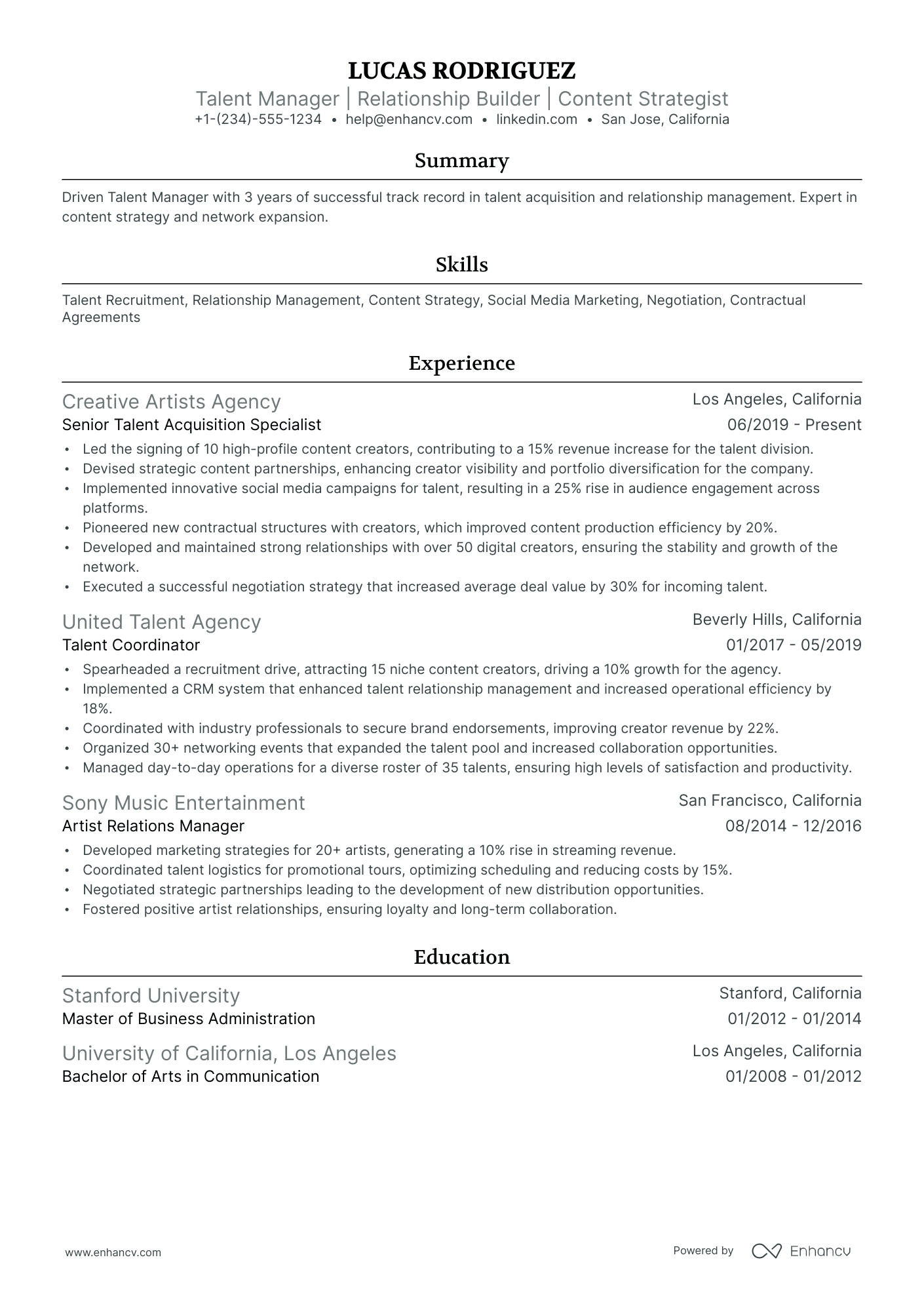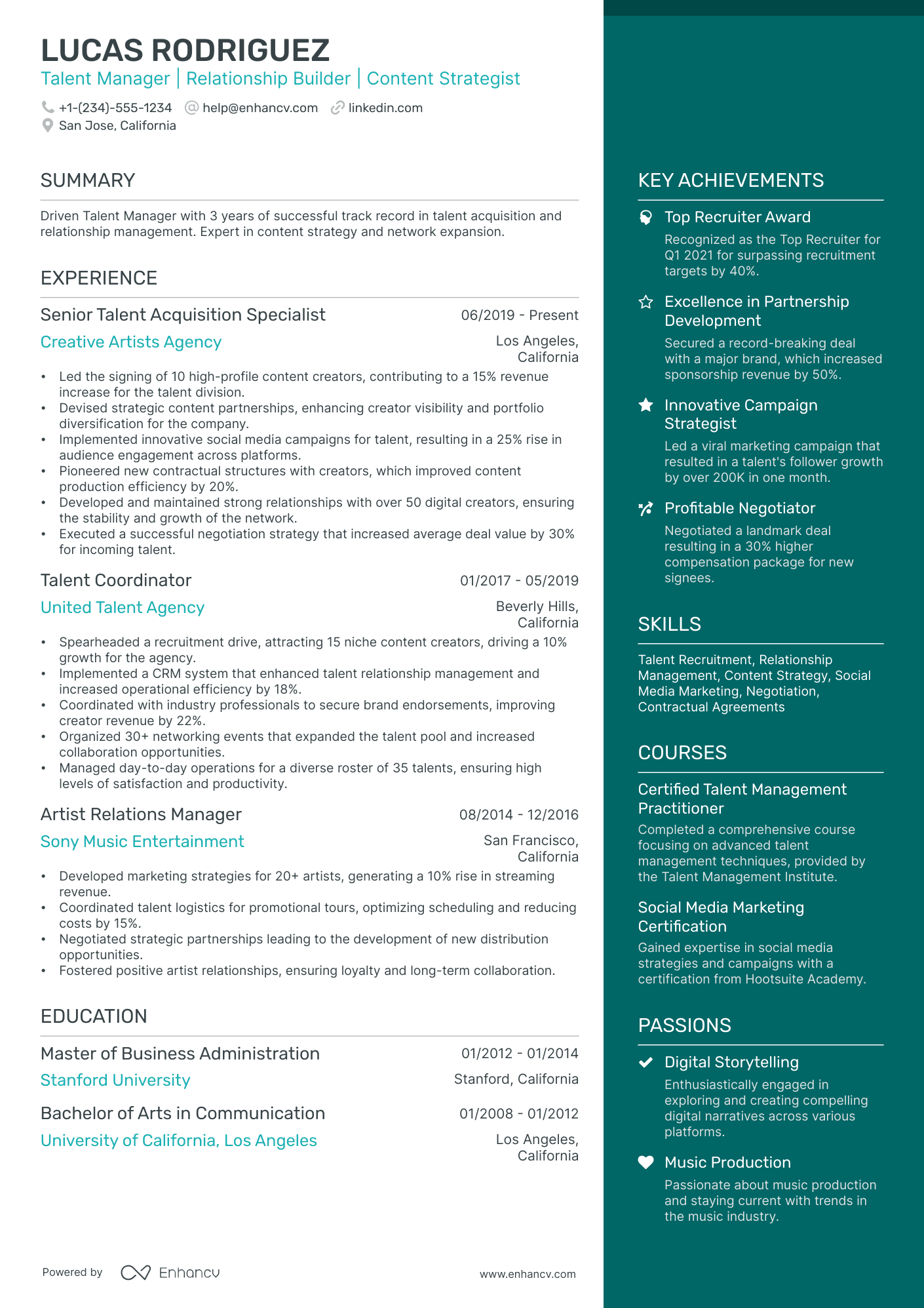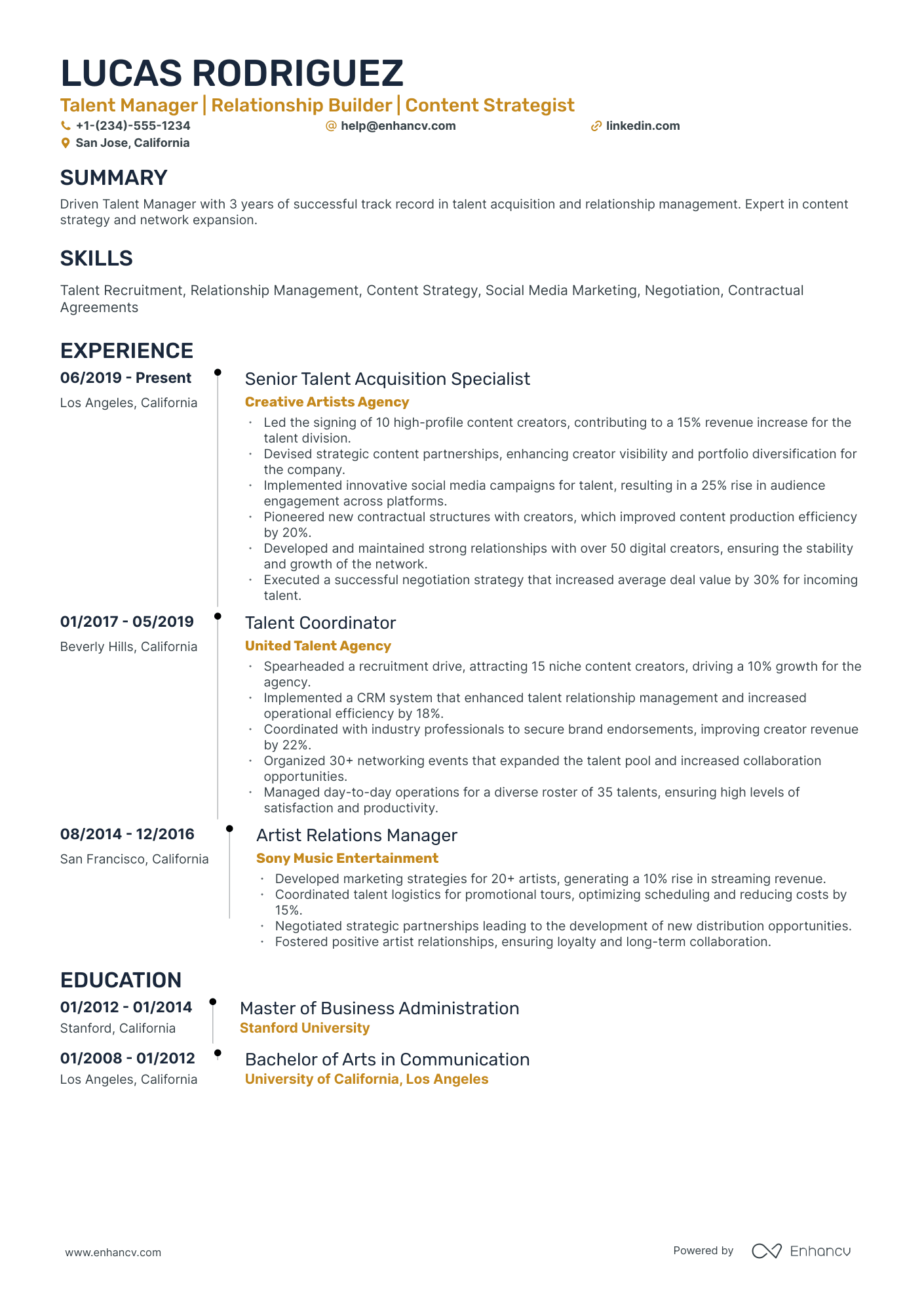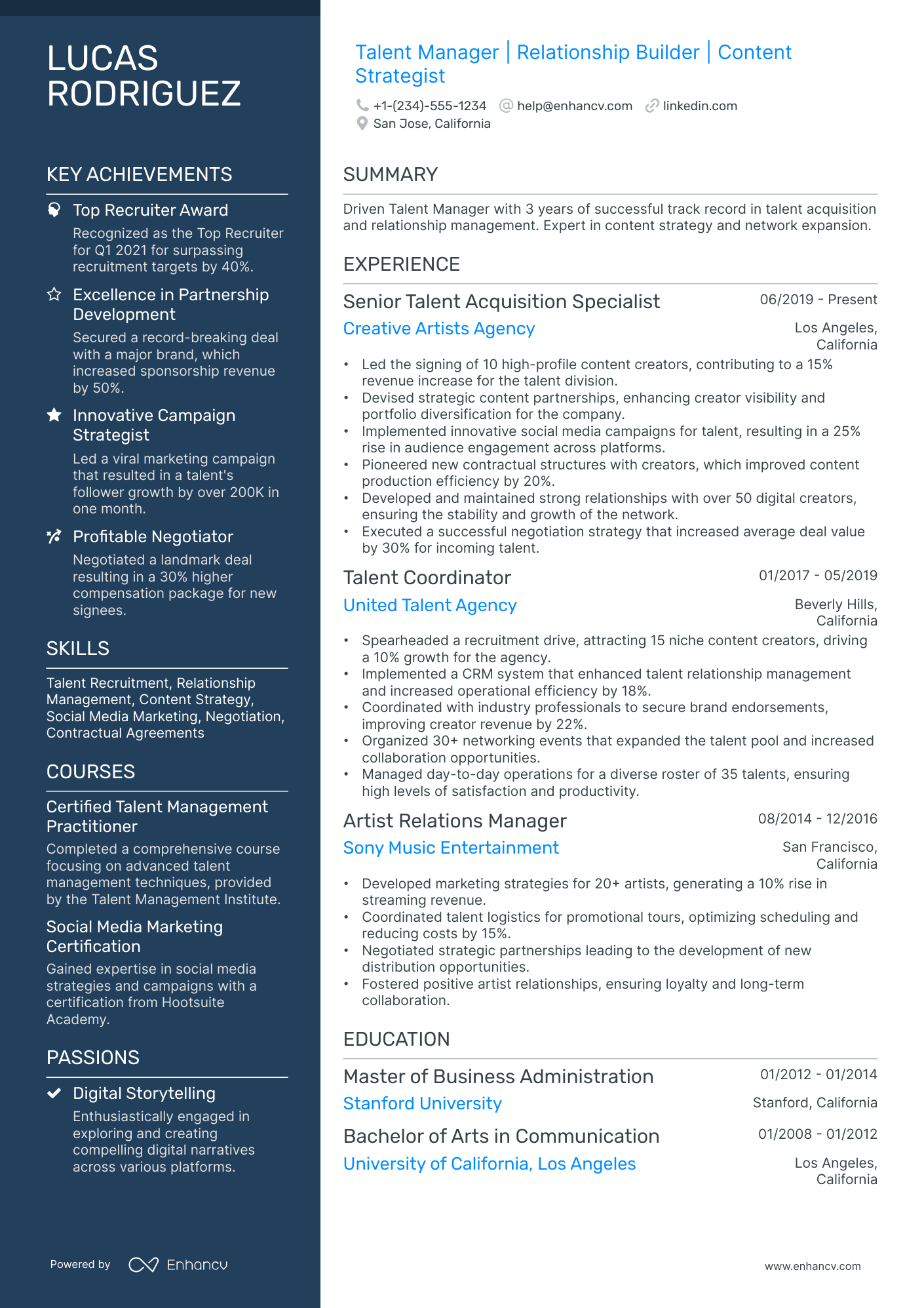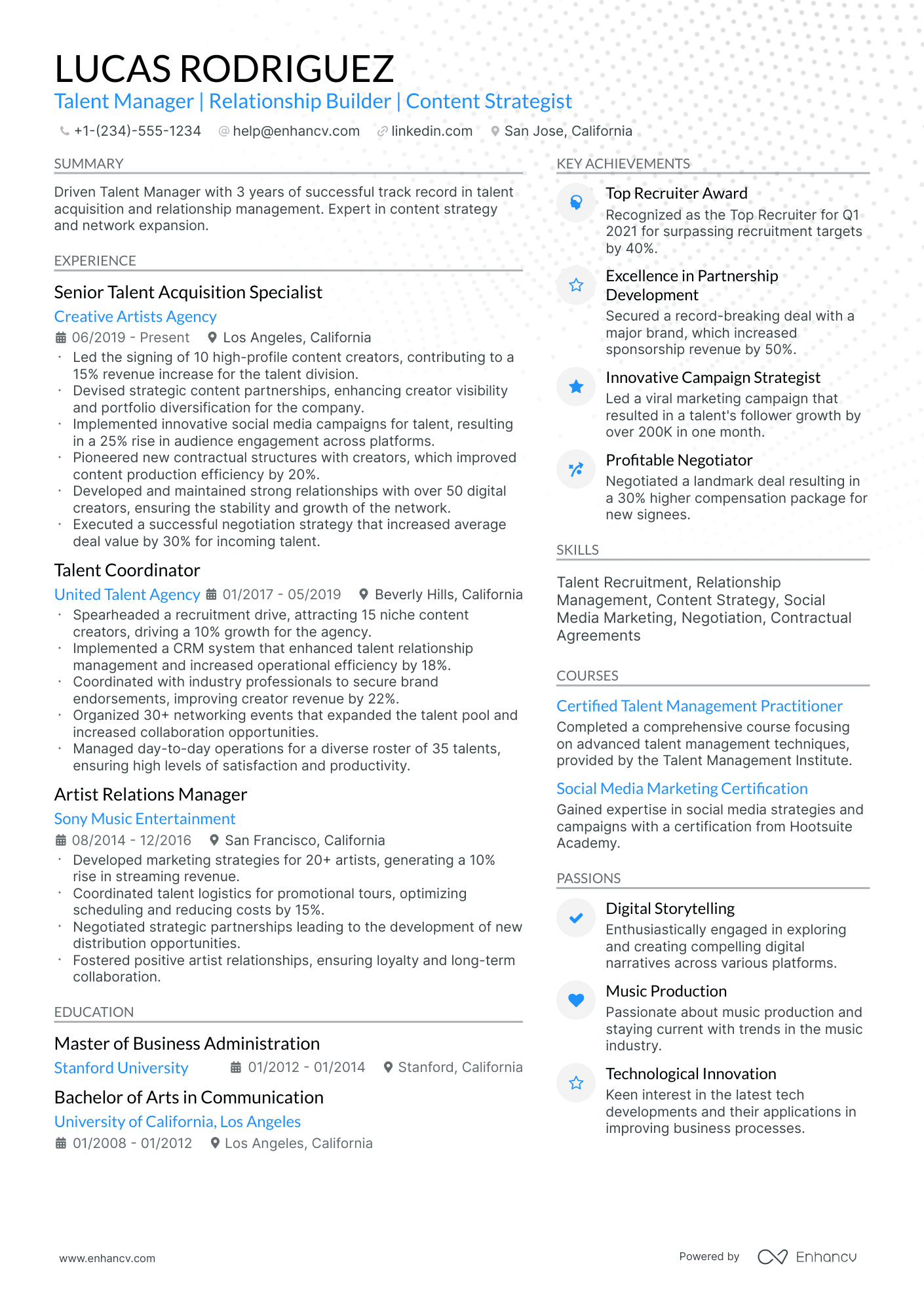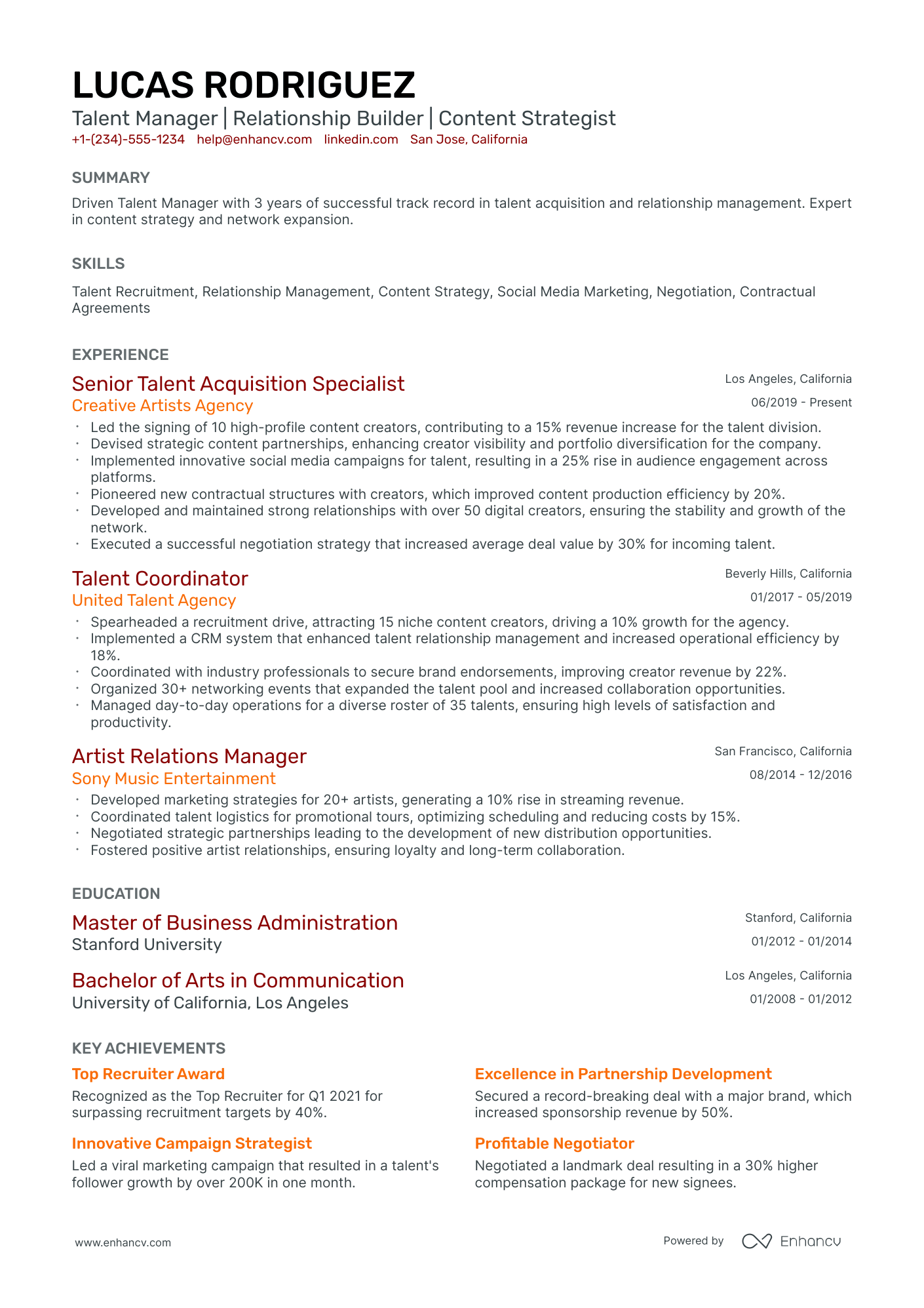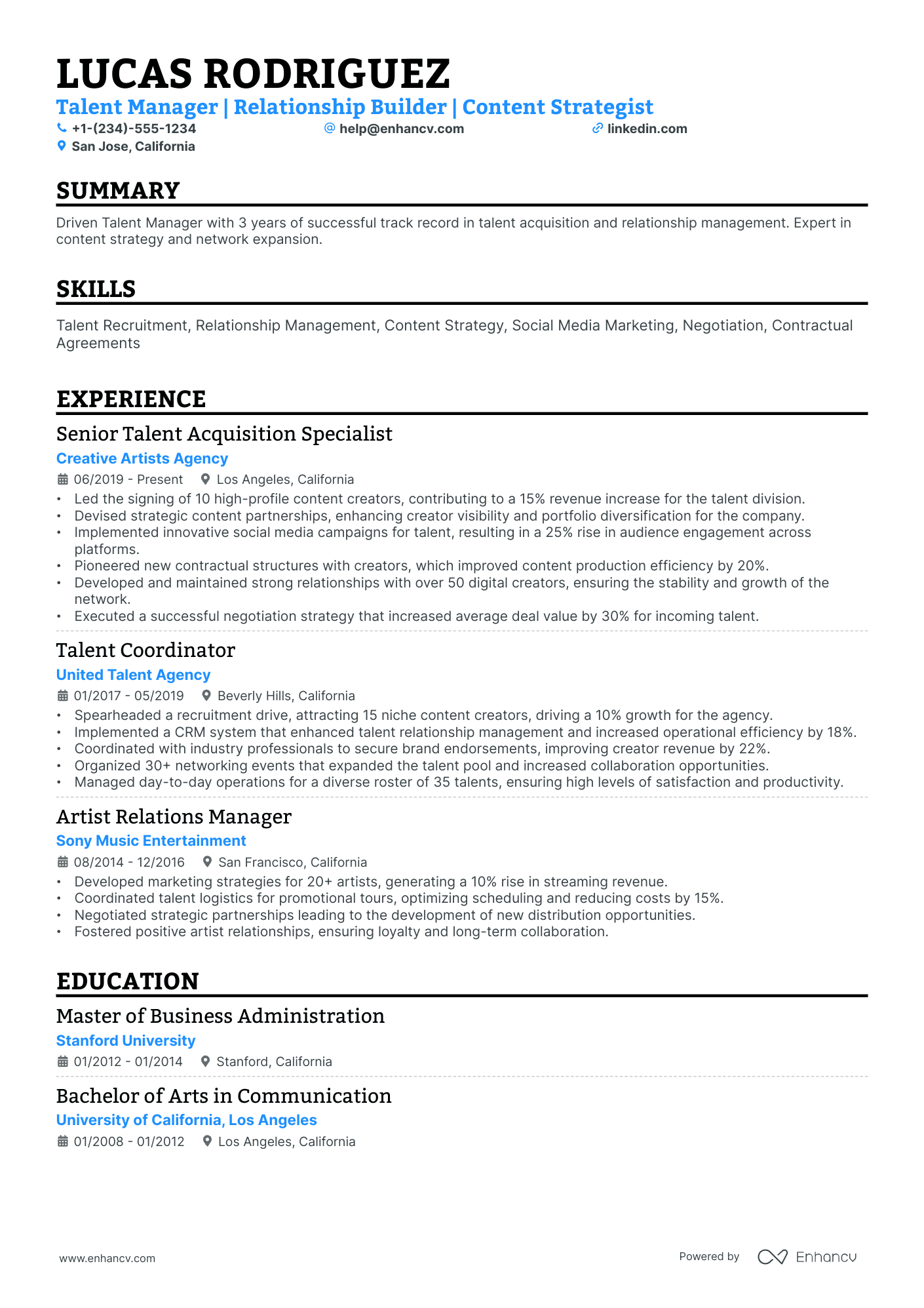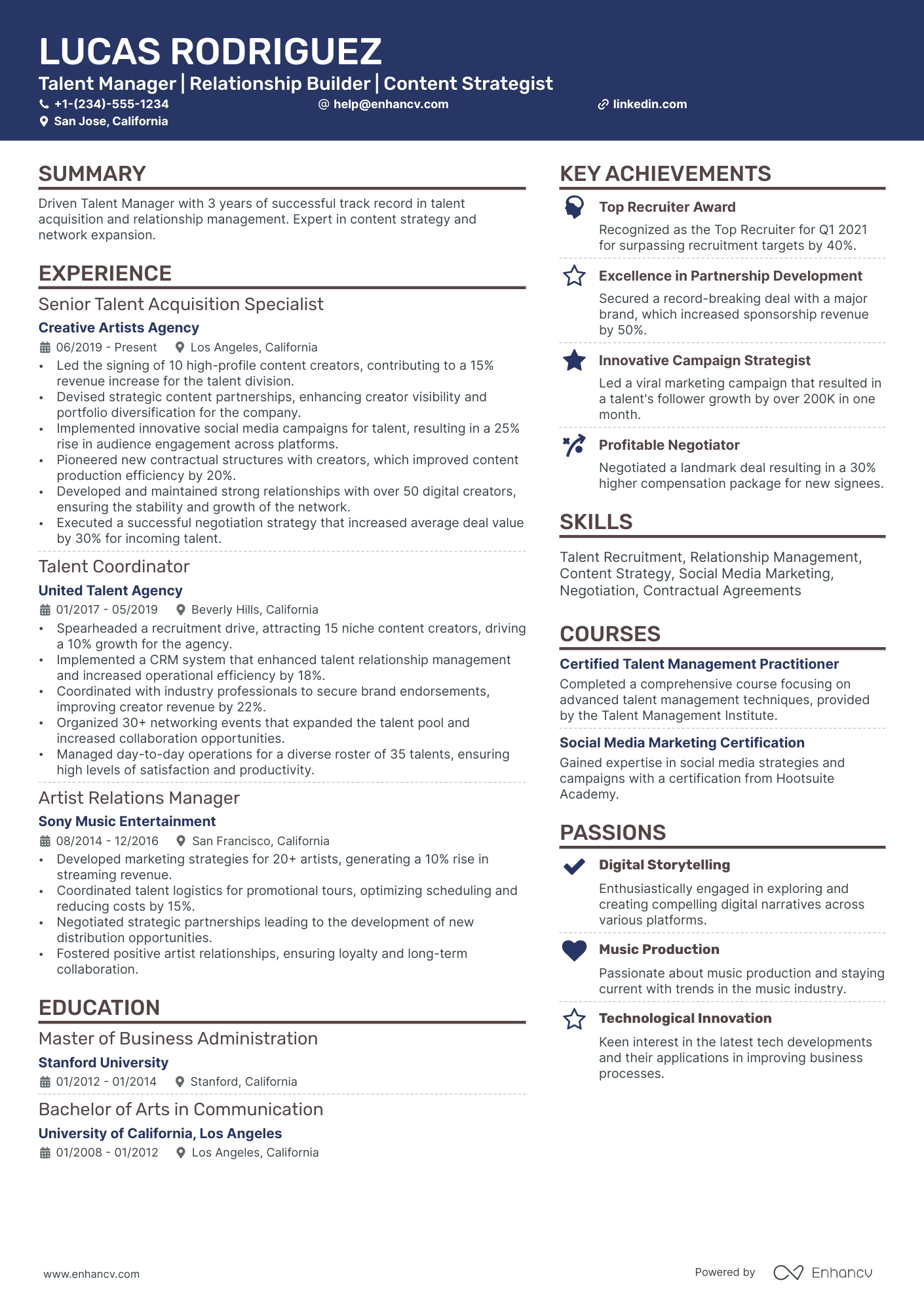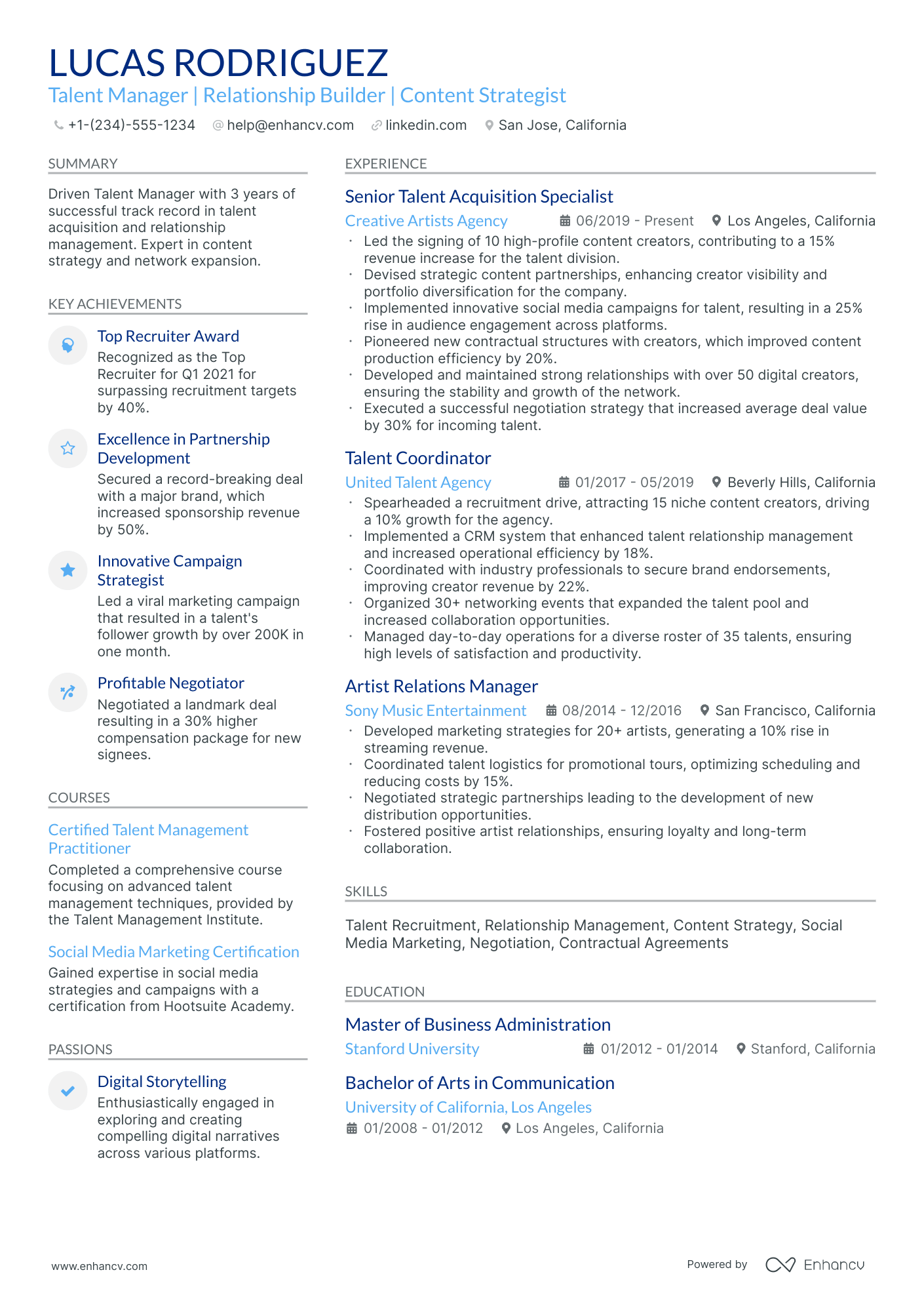One specific resume challenge you may face as a talent manager is articulating your experience in a way that demonstrates your expertise in talent acquisition, development, and retention strategies. Our guide provides tailored tips and examples to help you effectively craft your resume, ensuring each aspect of your unique skill set is showcased to potential employers.
- Which sections do you need to include in your resume to meet recruiters' requirements;
- How to write your talent manager resume experience section - even if you have don't have little to no work experience;
- Real-life professional examples to guide you how to write the most important talent manager resume sections;
- Adding even more sections so your talent manager resume stands out with professionalism and your personality.
We've also selected some of the best (and most relevant) resume guides for the talent manager role you're applying for:
- HR Project Manager Resume Example
- Continuous Improvement Manager Resume Example
- Training Director Resume Example
- HR Program Manager Resume Example
- HR Analyst Resume Example
- Recruiter Resume Example
- HR Business Partner Resume Example
- Benefits Manager Resume Example
- Assistant Operations Manager Resume Example
- Benefits Analyst Resume Example
Best practices for the look and feel of your talent manager resume
Before you even start writing your talent manager resume, first you need to consider its layout and format.
What's important to keep in mind is:
- The reverse-chronological resume is the most widely used format to present your experience, starting with your latest job.
- Your talent manager resume header needs to include your correct, professional contact details. If you happen to have a professional portfolio or an updated LinkedIn profile, include a link to it.
- Ensure your resume is no longer than two pages - you don't have to include irelevant experience on your resume just to make it look longer.
- Unless specified otherwise, submit your resume in the most popular format, the PDF one, as this will ensure your talent manager resume isn't altered.
Upload & Check Your Resume
Drop your resume here or choose a file. PDF & DOCX only. Max 2MB file size.
PRO TIP
Listing your relevant degrees or certificates on your talent manager resume is a win-win situation. Not only does it hint at your technical capabilities in the industry, but an array of soft skills, like perseverance, adaptability, and motivation.
The key to your talent manager job-winning resume - present your expertise with these sections:
- A header to make your resume more scannable
- Snapshot of who you are as a professional with your resume soft skills, achievements, and summary or objective
- Job advert keywords in the skills section of your resume
- Resume experience quantifying your past job successes with metrics
- A relevant education, certification, and technical sills section to provide background to your technological/software capabilities
What recruiters want to see on your resume:
- Strong network within the industry showcasing relationships with casting directors, producers, and talent.
- Proven track record of talent development and career advancement for clients.
- Excellent negotiation skills with experience in contract negotiation and deal-making.
- Demonstrable ability to identify and scout promising talent, with a keen eye for marketability and potential stardom.
- Experience managing public relations and media for clients, including crisis management and image control.
What is the resume experience section and how to write one for your past roles
The experience section in a talent manager resume is critical for your profile and overall application. It should not only display your work history, but also highlight your achievements in previous roles.
Many candidates either simply list their duties or provide excessive details about past, irrelevant jobs. A more effective approach involves first examining the job advertisement for keywords - specifically, skills essential for the role. Then, demonstrate these key requirements throughout different parts of your resume, using accomplishments from your roles.
Format each bullet point in your experience section by starting with a strong action verb. Follow this with a description of your role and its impact on the team or organization.
Aim to include three to five bullet points for each role.
Finally, gain insights into how professionals have crafted their talent manager resume experience sections by exploring some best practice examples.
- Spearheaded talent acquisition efforts for over 50 artists and performers, increasing the roster size by 35% within a 2-year period.
- Negotiated and secured favorable contracts for clients with major labels and production companies leading to an average 20% royalty increase.
- Developed and executed bespoke career development plans which enhanced client visibility and led to a 40% increase in booked engagements.
- Implemented a digital-first strategy for talent promotion, utilizing social media platforms and increasing online following by an average of 250,000 per client.
- Coordinated with international promoters to expand tour opportunities, resulting in a 30% rise in international bookings.
- Implemented branding partnerships that aligned clients with major corporate brands for sponsorships, enhancing client marketability and income streams.
- Launched a comprehensive mentorship program which paired novice talents with industry veterans, improving talent retention by 25%.
- Oversaw client public relations strategies, effectively navigating crises and maintaining positive public image through strategic press releases and interviews.
- Fostered relationships with industry influencers and media outlets to secure prime exposure for clients, leading to a significant uptick in high-profile appearances.
- Cultivated a tech-savvy approach to client management, integrating AI and data analytics to identify trends and position clients advantageously.
- Secured lead roles for clients in award-winning film projects with a combined box office gross of over $500 million.
- Orchestrated successful cross-industry transitions for clients, from music to film and television, diversifying income streams and fan base.
- Streamlined internal processes for client engagement and communication, reducing response times by 50% and improving client satisfaction scores.
- Collaborated with new media platforms to create original content for clients, amplifying their digital presence and generating over 10 million views.
- Designed comprehensive personal branding strategies that defined client identity and authenticated their presence within niche markets.
- Increased client portfolio earnings by optimizing endorsement deals, resulting in a $2 million overall uplift.
- Established a reputation for identifying and nurturing young talent, often recognized for having an eye for future stars.
- Led a client's transition from traditional media to digital platforms, doubling engagement metrics and revitalizing the client's brand.
- Facilitated the production of a talent-led podcast series that topped iTunes charts within the first month of release.
- Coordinated with fashion industry giants for client appearances in ad campaigns, elevating the prestige and breadth of their professional scope.
- Executed strategic engagement plans for off-season periods, ensuring client relevance and discourse in media throughout the year.
- Introduced cutting-edge virtual event strategies for clients during global lockdowns, maintaining performance opportunities and revenue streams.
- Forged new relationships with streaming services, negotiating deals that placed clients in curated playlists with millions of listeners.
- Leveraged client analytics to inform promotional efforts across platforms, culminating in a multi-million-dollar tour deal.
The following content includes information from "O*NET OnLine" by the U.S. Department of Labor, Employment and Training Administration (USDOL/ETA). Used under the CC BY 4.0 license. The data represents the top responsibilities present on the task lists for talent manager professionals.
Top Responsibilities for Talent Manager:
- Collect fees, commissions, or other payments, according to contract terms.
- Send samples of clients' work and other promotional material to potential employers to obtain auditions, sponsorships, or endorsement deals.
- Keep informed of industry trends and deals.
- Conduct auditions or interviews to evaluate potential clients.
- Negotiate with managers, promoters, union officials, and other persons regarding clients' contractual rights and obligations.
- Confer with clients to develop strategies for their careers, and to explain actions taken on their behalf.
- Develop contacts with individuals and organizations, and apply effective strategies and techniques to ensure their clients' success.
- Schedule promotional or performance engagements for clients.
- Arrange meetings concerning issues involving their clients.
- Manage business and financial affairs for clients, such as arranging travel and lodging, selling tickets, and directing marketing and advertising activities.
Quantifying impact on your resume
- List the number of talents you have scouted, signed, or represented to demonstrate your scouting abilities.
- Include the percentage growth in bookings or earnings for your clients to show your effectiveness in promoting talent.
- Mention the overall revenue generated for your agency or clients to emphasize your contribution to the business's success.
- Quantify the number of successful marketing campaigns or brand endorsements secured for clients to showcase your negotiation skills.
- Highlight the increase in audience or fan base for clients using measurable metrics, like social media follower growth percentages.
- Specify the size of events or projects managed, including budgets, attendance figures, or viewership stats, to underline your event management prowess.
- Document the number of industry contacts or networks established to reflect your networking and relationship-building skills.
- Report consistent client retention rates to demonstrate client satisfaction and loyalty under your management.
Action verbs for your talent manager resume
What to do if you don't have any experience
It's quite often that candidates without relevant work experience apply for a more entry-level role - and they end up getting hired.
Candidate resumes without experience have these four elements in common:
- Instead of listing their experience in reverse-chronological format (starting with the latest), they've selected a functional-skill-based format. In that way, talent manager resumes become more focused on strengths and skills
- Transferrable skills - or ones obtained thanks to work and life experience - have become the core of the resume
- Within the objective, you'd find career achievements, the reason behind the application, and the unique value the candidate brings about to the specific role
- Candidate skills are selected to cover basic requirements, but also show any niche expertise.
Recommended reads:
PRO TIP
List all your relevant higher education degrees within your resume in reverse chronological order (starting with the latest). There are cases when your PhD in a particular field could help you stand apart from other candidates.
Popular talent manager hard skills and soft skills for your resume
Apart from assessing your professional expertise, recruiters are on the lookout for whether your skills align with the job.
Your profile would thus be assessed in regard to your:
- Hard or technical skills - your ability to perform on the job using particular technologies or software
- Soft skills - how you adapt, communicate, and thrive in different environments.
Both types of skills - hard and soft skills - are important for your resume, so make sure to create a dedicated skills section that:
- Lists up to five or six skills that align with the job advert.
- Integrates vital keywords for the industry, but also reflects on your personal strengths.
- Builds up further your skills with an achievements section within which you explain what you've achieved thanks to using the particular skill.
- Aims to always quantify in some way how you've used the skill, as it's not enough to just list it.
What are the most sought out hard and soft skills for talent manager roles?
Check out the industry's top choices with our two dedicated lists below:
Top skills for your talent manager resume:
Applicant Tracking Systems (ATS)
Human Resource Information Systems (HRIS)
Performance Management Software
Talent Assessment Tools
Data Analysis and Reporting Tools
Employee Engagement Platforms
Recruitment Marketing Software
Learning Management Systems (LMS)
Compensation Management Software
Onboarding Solutions
Communication
Interpersonal Skills
Emotional Intelligence
Conflict Resolution
Negotiation
Adaptability
Team Collaboration
Problem-Solving
Strategic Thinking
Leadership
Next, you will find information on the top technologies for talent manager professonals from "O*NET OnLine" by the U.S. Department of Labor, Employment and Training Administration (USDOL/ETA). Used under the CC BY 4.0 license.
Top technologies for Talent Manager’s resume:
- Videoconferencing software
- Zoom
- Email software
- Microsoft Outlook
PRO TIP
If you failed to obtain one of the certificates, as listed in the requirements, but decide to include it on your resume, make sure to include a note somewhere that you have the "relevant training, but are planning to re-take the exams". Support this statement with the actual date you're planning to be re-examined. Always be honest on your resume.
Discover the perfect certification and education to list on your talent manager resume
Value the insights your resume education section offers. It can shed light on various proficiencies and experiences tailored for the job.
- Add only college or university degrees, stating the institution and duration.
- If you're nearing the end of your degree, note your graduation date.
- Weigh the pros and cons of including unrelated degrees - it might not be your best choice with so little space on your resume.
- Talk about your educational achievements if they amplify your relevant experience.
There are so many certificates you can list on your resume.
Just which ones should make the cut?
- List your prominent higher education degree in a separate box, alongside the name of the institute you've obtained it from and your graduation dates
- Curate only relevant certificates that support your expertise, hard skills, and soft skills
- Certificates that are more niche (and rare) within the industry could be listed closer to the top. Also, this space could be dedicated to more recent certifications you've attained
- Add a description to your certificates or education, only if you deem this could further enhance your chances of showcasing your unique skill set
When listing your certificates, remember that it isn't a case of "the more, the merrier", but rather "the more applicable they are to the industry, the better".
Recruiters have hinted that these are some of the most in-demand certificates for talent manager roles across the industry:
The top 5 certifications for your talent manager resume:
- Senior Professional in Human Resources (SPHR) - HR Certification Institute (HRCI)
- Professional in Human Resources (PHR) - HR Certification Institute (HRCI)
- Certified Professional in Learning and Performance (CPLP) - Association for Talent Development (ATD)
- Society for Human Resource Management Certified Professional (SHRM-CP) - Society for Human Resource Management (SHRM)
- Certified Talent Development Manager (CTDM) - Talent Management Institute (TMI)
The content below includes information from "O*NET OnLine" by the U.S. Department of Labor, Employment and Training Administration (USDOL/ETA). Used under the CC BY 4.0 license. The data represents the top associations for talent manager professionals.
Top US associations for a Talent Manager professional
- Association of Performing Arts Professionals
- Association of Talent Agents
- International Association for Media and Communication Research
- International Entertainment Buyers Association
- International Radio and Television Society Foundation
PRO TIP
List your educational qualifications and certifications in reverse chronological order.
Recommended reads:
Talent manager resume summary or objective? The best choice is based on your experience
If you're wondering about the relevancy of the resume summary or the resume objective to your talent manager application - here's the truth.
The summary and objective provide recruiters with your expertise and accomplishments at a glance, within an up-to-five-sentence structure.
The difference is that the:
- Resume objective is also more focused on emphasizing your career goals. The objective is the perfect fit for (potentially more junior) candidates who'd like to balance their relevant experience with their career goals.
- Resume summary can provide you with space to also detail the unique value of what it's like to work with you. Talent manager candidates who have many noteworthy accomplishments start from the get-go with their summary.
Ensure that either type of resume introduction presents your talent manager expertise in the best light and aligns it with the job advert.
The more details you can provide with numbers, the more compelling your resume summary or objective will be.
Real-world talent manager candidates follow these frameworks in writing their resume summaries and objectives.
The end results are usually as such:
Resume summaries for a talent manager job
- With over 10 years of proven experience in the entertainment industry, this seasoned talent manager specialized in launching successful careers and has shaped the growth of multiple award-winning artists. Strong aptitude for talent scouting, contract negotiations, and strategic career planning. Spearheaded a campaign that resulted in a client securing a Grammy nomination.
- Dedicated HR professional adept at talent acquisition and employee relations making a strategic transition into talent management. Brings 8 years of experience driving organizational growth by identifying and recruiting top-tier talent. Proficient in the latest HRIS technologies and with a solid record of reducing turnover by 30% through improved engagement techniques.
- Former Marketing Executive with a 12-year track record of creating lucrative brand campaigns eager to pivot towards talent management and foster the development of industry-leading professionals. Expertise in brand strategy and a deep understanding of market dynamics to guide clients toward maximized exposure and opportunities. Successfully executed a campaign that increased market share by 20% within a highly competitive sector.
- Energetic professional with 5 years of experience in sales management, seeking to transfer skills into talent management. Exceptional at building relationships, coaching for peak performance, and understanding individual motivators. Adept at creating incentive programs that led to a 25% increase in sales team productivity within a fiscal year.
- Aspiring to leverage my interpersonal skills and an unwavering passion for the performing arts to embark on a career in talent management. Eager to apply a fresh perspective and adaptive communication style to advocate for and develop burgeoning talents. Objective: to provide comprehensive support and guidance, nurturing the growth of new artists in a dynamic industry.
- Embarking on a talent management career with a focus on cultivating exceptional customer service skills honed over 6 years in the hospitality industry. Seeking to apply a unique blend of problem-solving and relationship-building abilities to foster the careers of promising talents. Objective: to facilitate client success by ensuring a seamless alignment of their personal goals with strategic opportunities.
Average salary info by state in the US for Talent Manager professionals
Local salary info for Talent Manager.” Source: My Next Move, National Center for O*NET Development. Accessed 10/15/2024
| State | Average Salary (in USD) |
|---|---|
| US National Average | $84,900 |
| California (CA) | $103,290 |
| Texas (TX) | $71,300 |
| Florida (FL) | $51,060 |
| New York (NY) | $91,190 |
| Pennsylvania (PA) | $56,790 |
| Illinois (IL) | $96,110 |
| Ohio (OH) | $52,270 |
| Michigan (MI) | $54,000 |
Other relevant sections for your talent manager resume
Apart from the standard talent manager resume sections listed in this guide, you have the opportunity to get creative with building your profile. Select additional resume sections that you deem align with the role, department, or company culture. Good choices for your talent manager resume include:
- Language skills - always ensure that you have qualified each language you speak according to relevant frameworks;
- Hobbies - you could share more about your favorite books, how you spend your time, etc. ;
- Volunteering - to highlight the causes you care about;
- Awards - for your most prominent talent manager professional accolades and achievements.
Make sure that these sections don't take too much away from your experience, but instead build up your talent manager professional profile.
Key takeaways
- All aspects of your resume should be selected to support your bid for being the perfect candidate for the role;
- Be intentional about listing your skill set to be balanced with both technical and people capabilities, while aligning with the job;
- Include any experience items that are relevant to the role and ensure you feature the outcomes of your responsibilities;
- Use the summary or objective as a screenshot of your best experience highlights;
- Curate various resume sections to showcase personal, transferable skills.
